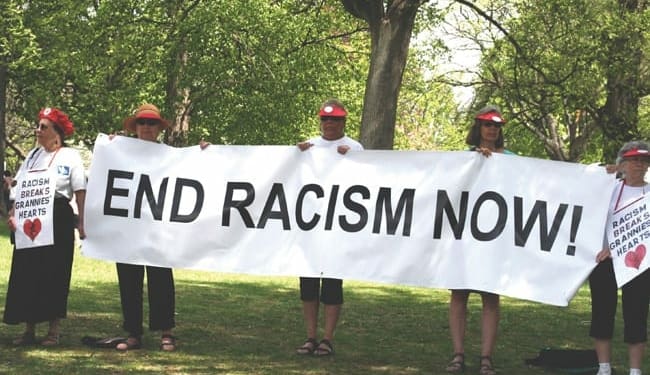In an annual tradition, Grannies for Peace once again stood in a silent vigil at Tulip Fest, this time deviating from the group’s usual anti-wartime messages to touch on racism. Grannies for Peace has been gathering for several years in Washington Park, hoping to bring peaceful messages to those at Albany’s Tulip Fest. This year, the Capital District grandmothers stood to call for an end to racism as dozens of news organizations report violence against African-Americans. “We must work to restructure our society to increase educational opportunities, address economic disparity, and end police brutality and mass incarceration. To confront and overcome racism in our culture, attention much be paid to each of these issues,” said grandmother Mabel Leon in a released statement. While Grannies for Peace usually touches on messages of peace during wartime, including gun control, veteran reforms, and advocating against violent video games, the grannies decided to spread the message of equality. Tulip Fest attendees saw the grandmothers toting a banner that read “End Racism Now!” and “Black Lives Matter,” a movement that began after George Zimmerman was acquitted in the death of Trayvon Martin in 2012. The grannies also wore signs around their necks reading “Racism Breaks Grannies’ Hearts.” Grandmother Mickie Lynn said that the response Grannies for Peace received for the vigil was overwhelmingly positive. She said that young adults would ask to take pictures with grannies wearing the signs, and people would come up to the group to shake hands, give hugs and high fives. “The vigil and leafleting were received with enthusiasm above and beyond any experience that we’ve ever had at our annual Tulip Festival vigils. It was exhilarating and extended not only to the hour-long vigil itself, but to Grannies walking to and from the vigil site,” said Lynn. In addition to the signs, Grannies for Peace members handed out leaflets that touched on the group’s solidarity with mothers and grandmothers, in coordination with Mother’s Day, whose families have been affected by racism and inequality. “With the current national awareness of the inequality of law enforcement and the legal system, this was just a topic whose time had come. But we never expected the tremendous response to our messages,” said Lynn.
Call for equality
Leave Comment



